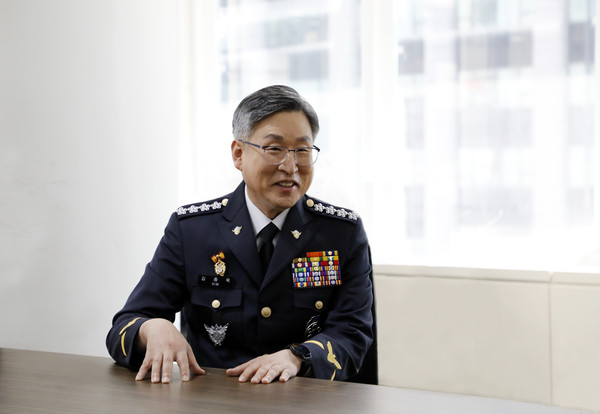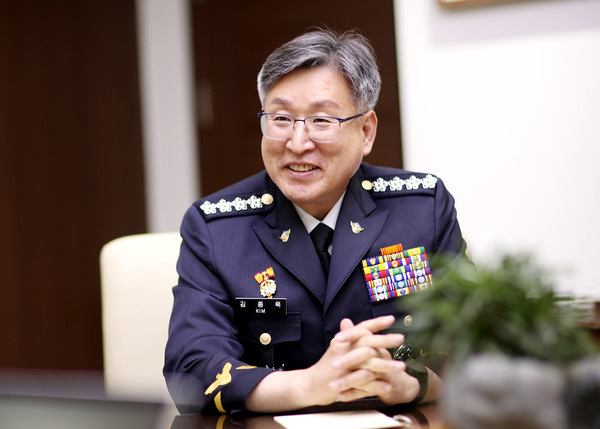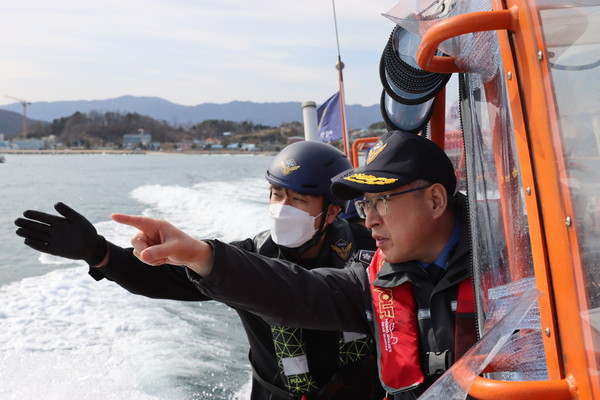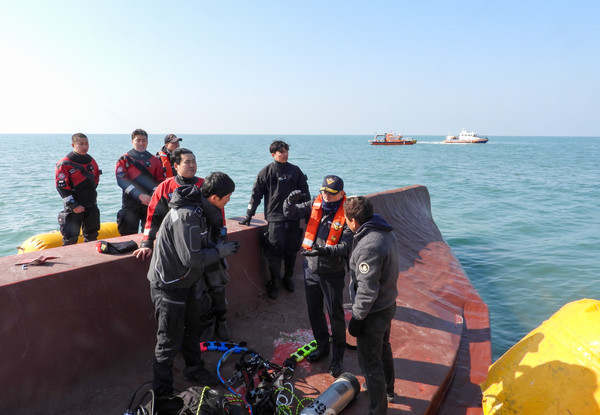States Commission General Kim Jong-Uk of KCG at an interview with The Korea Post
Korea Coast Guard (KCG) celebrates 70th anniversary of founding this year and on this auspicious occasion Director General Kim Jong-Uk quoted a wise-saying, “He who rules the seas rules the world!”
Then he made the following remarks in the process of introduction of his organization, the KCG:
The aforementioned quote first appeared in the days when Britain ruled the world. However, it is still considered to be true.
The sea is no longer just a sea but is considered an extension of the land.
Today's oceans are of great significance and national importance.
And the maritime police force that protects the country has a very important mission.
Today, the Korea Coast Guard is not just an organization performing the role of police in the seas.

The KCG protects the national territory 24 hours a day at the forefront of national security, and handles all incidents that occur at sea, such as fishery protection, fishermen protection, maritime crime investigation, pollution prevention, environmental protection, as well as maritime accidents and distress rescue.
In the past, the Korea Coast Guard has faced many difficulties. At times, the KCG has been falsely accused and its very existence has been severely damaged.
But now the KCG is back on its feet and back to its mission.
Questions and answers exchanged at a recent interview with Director General Kim follow:
Question: What is the mission of the Korea Coast Guard?
Answer: The Korea Coast Guard was founded in 1953 and this year marks its 70th anniversary.
With more than 13,000 members, 363 ships, and 25 aircraft, we are responsible for the safety and security of our nation's waters.
The Coast Guard is a comprehensive maritime security organization that performs complex and diverse duties, including coastal safety management such as maritime search and rescue, maintenance of maritime order such as ship traffic control, prevention and enforcement of maritime crimes, prevention and control of marine pollution, and security activities to protect maritime sovereignty.

Q: What is the policy to which you pay the most special attention?
A: The Korea Coast Guard's most important job is to keep the people and county safe. it is important that the general public is reassured that the Coast Guard can accomplish its mission no matter what happens.
Since my inauguration, I have emphasized the need to establish a strong maritime police force in the field, and in the wake of the capsizing of the Cheongbo-ho vessel, I have strengthened life-saving training that reflects the characteristics of the vessel structure and the sea area to secure realistic rescue capabilities.
As a result, casualties in the first half of the year were 6.2% lower than the last three-year average.
There occurred 30 casualties in the first half of the year, down 6.2% (2 persons) from the three-year average of 32*.

In addition, the government is promoting the enactment of the "Law on the Establishment and Operation of Civilian Maritime Rescue Teams" to further strengthen the public-private cooperation system in the event of a maritime accident.
It is also committed to eradicating narcotic drug crime, which has become a social problem in recent years.
The number of arrests: 60 in '2017 which were increased to 962 in '2022, a 16-fold growth.
The Korea Coast Guard has many important, competent organizations and personnel, establishing a system of coordination between related organizations in Korea and around the world, and has carried out the special investigations against narcotic drug crimes. The new KCG has accomplished many important things.

The KCG established the ”Dedicated Dope Investigation Team (86 members),” signed a business agreement with the Korea Customs Service and a Letter of Intent with the Colombian Navy.
The KCG has significantly strengthened investigative capabilities and conducted various investigations to safeguard the law and order so that people's freedom is not violated.
The KCG has conducted investigations into national financial crimes such as subsidy misappropriation, and enhanced its capability to respond to maritime cyber crimes by establishing a dedicated cyber investigation unit.
In addition, the KCG is promoting the computerization of various aspects of the activities to ensure the administration of justice by building a next-generation criminal justice information system (KICS) that can handle the specificities of the maritime environment all around the clock.
Q: As the Coast Guard celebrates its 70th anniversary this year, what are the challenges facing the organization and what kind of organization would you like to see it become in the future?
A: The task of the Korea Coast Guard is to fulfill its mission of protecting the seas of Korea and the adjoining areas, our territory as a whole.
To strengthen our ability to respond to illegally fishing foreign vessels that breaches into our seas, we are gradually increasing our security forces and establishing an efficient security strategy by quickly and accurately identifying the maritime situation.
We are also focusing on the establishment of the MDA (Maritime Information Convergence Platform) system, which is the core of our national task.
Real-time surveillance coverage will be increased from 16% today to70% in the near future.
To this end, we are expanding advanced surveillance assets such as satellites and drones and introducing an 'AI maritime security support system' that can converge and analyze various maritime information.
In the future, the Korea Coast Guard will strengthen cooperation and solidarity with the international community and establish itself as a global maritime police force that meets the expectations of the international community as well as that of the Republic of Korea.
With the Indo-Pacific area strategy centered on the maritime domain and the emergence of transnational threats such as terrorism, infectious diseases, large-scale disasters, and cyberattacks that cannot be addressed by a single country's efforts, the Korea Coast Guard is strengthening its cooperation with key members of the ASEAN.
In March, the Korea Coast Guard dispatched an emergency response team to the Philippines to provide humanitarian assistance for the marine pollution incident, and in April, the KCG established a strategic partnership with India through a meeting of heads of maritime law enforcement agencies.
We also recently signed an MOU with the Ministry of Public Security of Vietnam (June 23) on cooperation on international crimes, including ship handover and narcotic drug investigation, and held a regular meeting with the Indonesian Coast Guard (July 3) to discuss maritime security and cooperation.
We will also introduce advanced science and technology into our work areas to become a smart maritime police force.
In order to carry out efficient work, we are conducting observation, communication, and search and rescue satellite projects, and we plan to carry out satellite-based maritime police missions by establishing a satellite center and developing satellite utilization technology.
Q: Cooperation with foreign organizations seems to be important due to the nature of the Coast Guard's work. What are your achievements and future plans to strengthen cooperation?
A: This year, bilateral and multilateral meetings that were suspended due to COVID-19 have been resumed in a friendly manner, and cooperation in various fields to expand the horizons of maritime cooperation has been promoted―with tangible results.
First of all, for the first time in three years, we held a regular meeting of the heads of maritime law enforcement agencies of Korea, India, China, Singapore, and Indonesia to quickly respond to maritime accidents and crises at home and abroad, and to expand practical cooperation to counter transnational offense, such as sex crimes, terrorism, narcotic drug crimes and human trafficking through the sea.
At the Korea-Vietnam Summit in June, the Korea Coast Guard's work on maritime security was reflected in the performance project, making a significant contribution to the country's diplomatic strategy.
In particular, in addition to the Vietnamese Coast Guard, with which we have been cooperating, we have also signed a maritime cooperation agreement (MOU) with the Vietnamese Ministry of Public Security, which is responsible for the security and safety of inland waterways and ports, for search and rescue, education and training, and the transfer of decommissioned ships, and are striving to diversify the quality of international cooperation beyond quantitative expansion.
We have also increased cooperation with Colombia, Peru, and Mexico, the world's leading cocaine producers, to combat the growing narcotic drug crimes.
In particular, during the visit of the Chief of Naval Operations of the Colombian Navy in June, we agreed to combat transnational crimes at sea and established a cooperation system to block drug-related crimes, such as cooperating in the investigation of drug-related crimes and joint operations.
In the second half of this year, we will participate in multilateral meetings such as the North Pacific Conference of Governors of Governments (NPCGF, Canada, September), the Heads of Asian Coast Guard Agencies (HACGAM, Türkiye, September), and the Conference of Governors of Global Governments (CGGS, Japan, October) to further strengthen practical maritime security cooperation.
Q: What is your final message to the people?
A: We will think at the level and perspective of the people, listen to their voices, and promote policies for the people.
As a strong maritime police force that fulfills its mission under any circumstances, we will strengthen our response capabilities through in-depth training and practical exercises to ensure flawless mission execution in the event of an accident.
In order to create a communicative and harmonious organization, I will set an exemplary foothold by strengthening communication based on listening and understanding, and boldly improving unnecessary practices.
We clearly recognize the mission and tasks given to the Coast Guard by the people, and we will do our best to fulfill them so that everyone can enjoy a safe sea.

